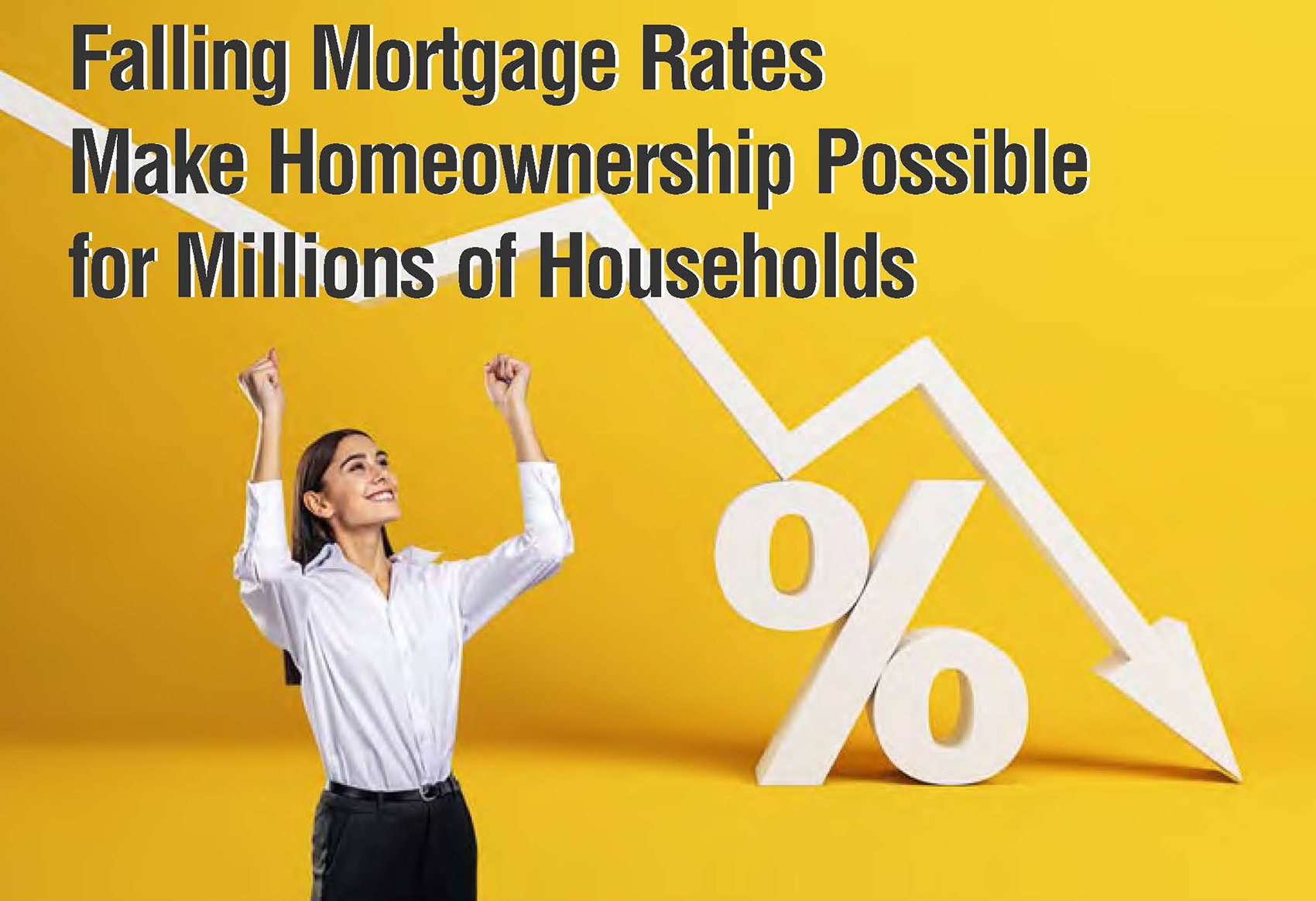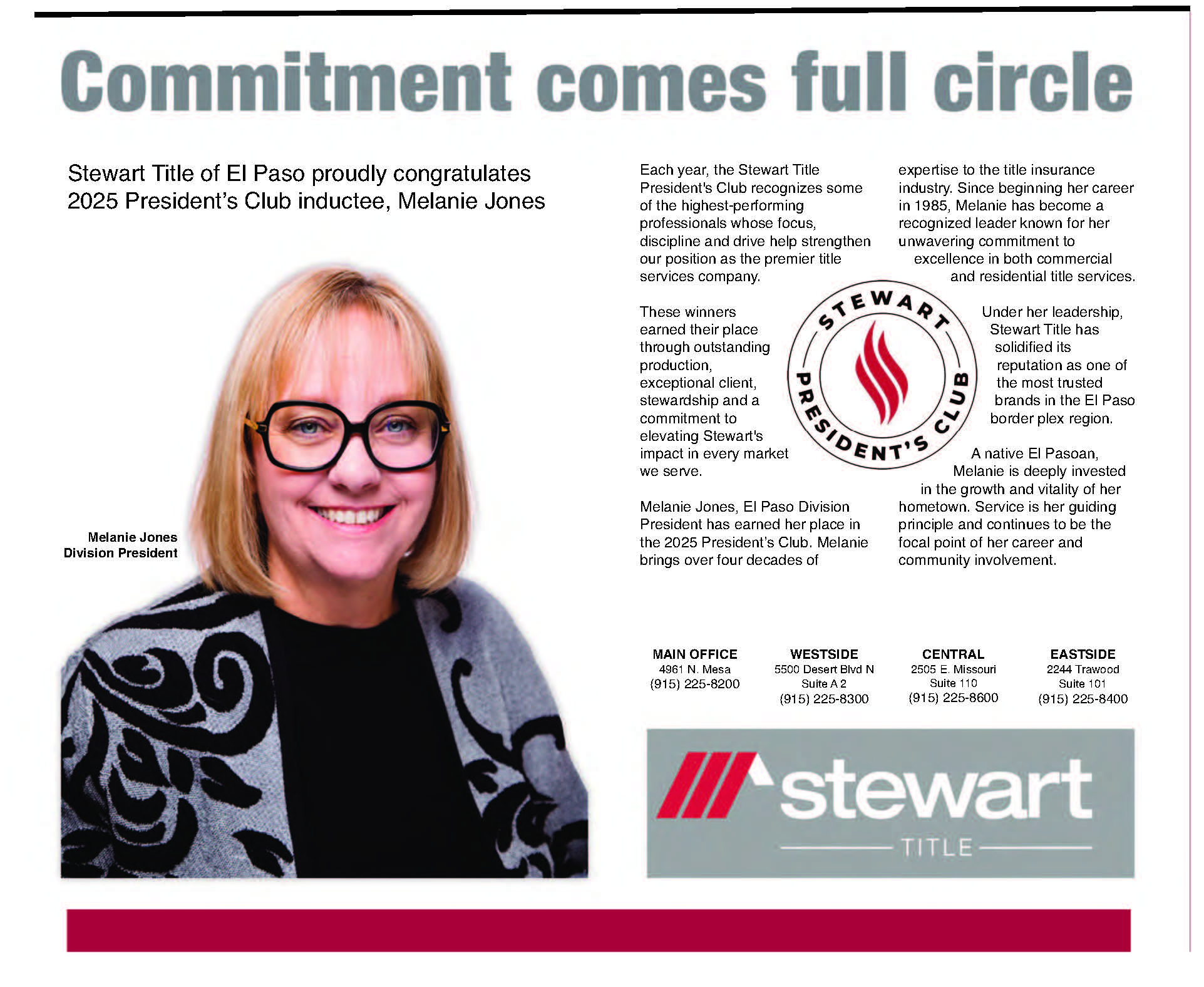
Falling Rates Make Ownership Possible
Even modest declines can have significant impact
The average interest rate on a 30-year fixed-rate mortgage fell to around 6% last week, the lowest rate borrowers have seen in close to three years. Borrowers will not only enjoy lower monthly payments at that rate, but it also makes homeownership possible for millions more.
Even modest declines in mortgage rates can have a significant impact on housing affordability, pricing more households back into the market. New NAHB Priced-Out Estimates illustrate how changes in interest rates affect the number of households that can afford a median-priced new home.
To begin 2026, the 30-year fixed mortgage rate averaged 6.25%. At that rate, around 31.5 million households could afford a new home at the national median price of $413,595, per lender underwriting standards. A modest 25 basis-point rate reduction from 6.25% to 6% would lower the qualifying income threshold sufficiently to allow 1.42 million additional households to afford a median-priced new home.
This sizable affordability response reflects the underlying distribution of U.S. household incomes. Household incomes are heavily concentrated in the middle of the distribution, with many households near key affordability thresholds. Approximately 79.8 million households earn less than $105,880, and an additional 14 million households earn between $105,881 and $132,350. When mortgage rates decline to near long-term averages (as they are now), the qualifying minimum income shifts downward into these densely populated income ranges, bringing a substantial number of households into the market.
In contrast, an equivalent 25 basis-point cut at higher interest rate levels has a smaller impact on affordability. For example, a decline from 7.75% to 7.5% would only price around 1 million households into the market. At higher rate levels, fewer households can qualify for a conforming mortgage.

PRESIDENT'S MESSAGE
Insights from IBS & KBIS 2026
Innovation, Personalization & Steady Progress
by Lydia Mlouhi
I recently had the opportunity to attend the 2026 International Builders’ Show (IBS) and Kitchen & Bath Industry Show (KBIS), held February 17–19 in Orlando, Florida. Held in conjunction, these events continue to be the premier destination for discovering new products, evaluating emerging trends, and learning directly from national industry leaders. This year’s show featured more than 2,250 exhibitors, spanned 1.2 million square feet, and welcomed over 115,000 attendees—an impressive display of the strength and scale of our industry.
A consistent highlight of IBS is the annual New American Home. The 2026 home, just under 8,000 square feet, exemplified modern luxury, innovation, and energy efficiency. Expansive glass walls, steel and concrete elements, and seamless indoor-outdoor living were thoughtfully balanced with warmth, comfort, and livability, demonstrating that performance and design can coexist at the highest level.
The Industry Outlook article, “Making Moderate Headway” reflected a tone of cautious optimism for 2026. National experts anticipate modest but steady gains, with remodeling remaining a bright spot as aging homeowners invest in functionality and longevity. Townhomes have gained market share, and higher-end custom homes now represent nearly 20% of the single-family market. At the same time, material price volatility, tariff uncertainty, and skilled labor shortages continue to present challenges that require strategic planning and adaptability.
On the KBIS side, one of the most compelling themes came from the research article “Personalization Is the New Luxury." Today’s homeowners are seeking ultra-customized spaces that reflect their lifestyle and priorities. Bathrooms in particular are evolving into personal retreats, with spa-inspired showers, integrated smart technology, improved storage solutions, aging-in-place features, and wellness-driven design elements becoming mainstream expectations rather than upgrades. Personalization, functionality, and comfort are driving purchasing decisions as much as aesthetics.
Overall, the message from Orlando was clear: while economic headwinds remain, there is meaningful opportunity for builders who stay informed, embrace innovation, and deliver thoughtful, personalized design solutions. Our industry continues to adapt, evolve, and move forward and IBS and KBIS 2026 reinforced that the future remains strong for those prepared to lead.


EXECUTIVE MESSAGE
And Just Like That...
We're entering the third month of 2026
By Ray Adauto - Executive Vice President, EPAB
Things are moving fast and faster, especially when you’re trying to do so many things at once. We are getting into the third month of the year, the world around us has changed, some good, some not so good. On the good side our members are still working hard to keep people housed. The leadership within our association has moved forward with new projects, new committees, and new drive.
Several members have taken on the tasks of setting up events, like golf. The committee made the decision to change venue, heading to Horizon Golf Course in September. We are fortunate that our Presenting Sponsor remains Haskins Electric, along with Hunt, Nusenda Credit Union, and Franklin Building Materials renewing their support. The committee will have some new twists for sponsorship opportunities. Our format is changing as we try to keep play moving while having fun. Stay tuned for more news on events and meetings.
I wasn't able to attend IBS in Orlando this year. This was the last scheduled time for Orlando as the site as Las Vegas is now the official home of the NAHB IBS. Reports from this year’s show were good, new items and processes, along with a lot of walking. Some members were worried their trip would be cancelled when the Federal government announced a ten-day shutdown of all traffic in and out of ELP. Fortunately, that order was rescinded in a few tense hours. The official cause may not be the real cause for the shutdown. We may not ever know. Just glad that those of you who did go were able to.
I also would like to take a moment to thank many of you for the kind words of support and prayers of healing while I go through some medical stuff. It’s not over but I’m working my way through it with a lot of help. I appreciate all of you.

Cooling Prices, Lean Inventory Shape 2025 Housing
New home sales closed out 2025 on a mixed yet resilient note, pointing to steady underlying demand even as affordability pressures and limited supply continued to weigh on the market. Although sales dipped 1.7% from November to December, activity in December 2025 remained stronger than a year earlier.
Data from the U.S. Department of Housing and Urban Development and the U.S. Census Bureau show that sales of newly built single-family homes finished the year at a seasonally adjusted annual rate of 745,000 units — a 3.8% increase compared with December 2024. For the full year, an estimated 679,000 new homes were sold in 2025, a modest 1.1% decline from the 2024 total.
Survey data from NAHB indicate that 67% of builders used sales incentives in December, the highest share recorded in the post-pandemic period. On average, builders reduced home prices by 5% during the month, underscoring ongoing efforts to attract cost-conscious buyers.
Inventory on the Decline:
Inventory of new single-family homes totaled 472,000 units in December, down 2.7% from November and 3.5% below December 2024 levels. At the current sales pace, this represents a 7.6-month supply, an improvement from the 8.2-month supply recorded one year earlier. (A six-month supply is typically viewed as a balanced market.)
At the same time, existing-home inventory has slipped after showing gradual improvement in prior months. Some moderation in home prices across both new and existing segments has helped sustain buyer demand despite persistent affordability challenges.
Taken together, new and existing home inventory has edged lower in recent months, falling to an overall four-month supply of total housing. This tightening largely reflects slower construction activity.
Buyers See Prices Improvements:
Home prices continued to show signs of softening in 2025. The median new home sales price declined 1.3% to $415,000, compared with $420,300 in 2024.
In 2025, new home sales were distributed across price tiers as follows:
• 20% were priced below $300,000
• 45% were priced between $300,000 and $500,000
• 34% were priced above $500,000
For additional insight into inventory trends and regional sales activity, see this Eye on Housing article from NAHB Assistant Vice President for Forecasting

Uncertainty Persists
Court strikes down Trump's tariffs
The Supreme Court on Feb. 20 ruled that President Trump’s attempts to use emergency powers under the International Emergency Economic Powers Act (IEEPA) was not valid.
While the Supreme Court’s ruling reins in presidential authority to impose tariffs under IEEPA, Trump still has wide latitude in setting tariff policy. Indeed, shortly after the Supreme Court verdict, the president announced he would impose a new, global tariff of 10%. The next day, he raised the figure to 15%.
Under the law he has now invoked, Section 122 of the Trade Act of 1974, tariffs may last only 150 days unless Congress extends them. And they’re capped at 15%, so the president can’t raise them again.
Moreover, the Supreme Court’s ruling does not reverse duties imposed under other statutory authorities available to the president. This includes the approximately 35% combined antidumping and countervailing duties on Canadian softwood lumber, the 10% global Section 232 tariff on softwood lumber, and the 50% global Section 232 tariff on steel and aluminum imports.
This tariff uncertainty — along with whether importers and businesses that paid tariffs under IEEPA can receive up to $175 billion in refunds — leaves tariff policy in a state of chaos, which will likely result in additional, complex litigation.
American consumers and businesses are unsure how any new tariffs will affect them. In the meantime, more than 60% of builders surveyed by NAHB have reported seeing higher costs because of tariffs.
With the nation facing a housing affordability crisis, NAHB continues to urge the president to exempt building materials as part of his tariff strategy because they raise construction costs, impede supply chains, and result in market and business uncertainty that make it difficult for builders to price their homes.

